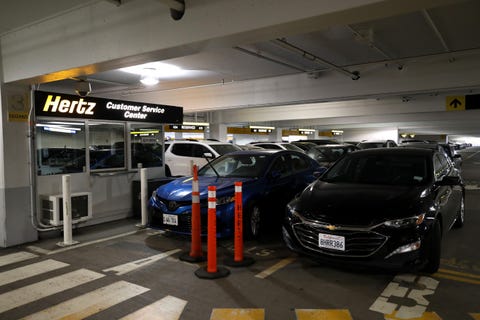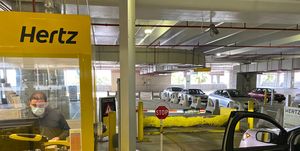
Justin SullivanGetty Images
Rental giant Hertz had been attempting to avoid a bankruptcy in recent weeks, sparked by a significant drop in airline and other travel due to the coronavirus pandemic. Among the companies that stand to lose business in this domino effect are automakers. Bloomberg reports that Hertz has canceled 90 percent of its new-car orders for the 2020 model year, which will in turn hurt automakers’ fleet sales for the rest of this year.
General Motors has been the single biggest supplier for the Hertz fleet of 567,000 vehicles in the United States, with GM models making up 21 percent of its fleet, spanning several brands. Fiat Chrysler Automobiles (FCA) has been its second biggest supplier, contributing to 18 percent of its domestic fleet. Ford has been in the third spot, contributing to 12 percent of its fleet, while Kia models have accounted for 10 percent of the fleet. Toyota, Nissan, and Hyundai vehicles accounted for 9 percent, 7 percent, and 5 percent of the Hertz fleet, respectively.
Of course, the rental giant’s fleet is in constant rotation and does not purchase 567,000 cars for its U.S. operations every year, but rather keeps vehicles in its U.S. operations for 18 months. Hertz’s international fleet of 204,000 vehicles is usually kept for 12 months, Bloomberg notes. Overall, fleet sales tend to account for approximately 20 percent of the Detroit Three automakers’ sales.
For its two most significant fleet suppliers, GM and FCA, this adds up to approximately 100,000 vehicles sold to Hertz by each automaker over a time period lasting about a year and a half. In recent weeks General Motors has even taken back cars that were headed to Hertz locations.
The rental-car industry crisis, of course, goes beyond Hertz. Avis sold 35,000 of its cars in March and has canceled 80 percent of its new car orders through the end of the year. Avis has seen an 8 percent decrease in revenue in the first quarter of 2020 but has moved aggressively to cut costs and downsize in response to the drop in travel during the pandemic, and is currently expected to survive the business environment of the pandemic as a company.
“We quickly responded to remove costs and preserve liquidity,” said Joe Ferraro, Avis Budget Group interim chief executive officer. “As of the end of April, we achieved over $2 billion of annualized cost removal actions, including reductions in head count, a significantly smaller vehicle fleet, and the elimination of all nonessential capital and operating expenses. However, we will remain vigilant and will identify additional cost removal actions if we experience a slower recovery or in the event of further disruption later in the year.”
Hertz is not alone, but it’s likely the one that faced the most pressing deadline. Hertz had until May 22 to come up with $400 million for holders of its asset-backed securities, and it had relatively few options for doing so—thus its move to Chapter 11 bankruptcy protection late on the Friday evening.
Even if Hertz and all other major rental companies stay in business through the end of 2020, they will likely do so with greatly decreased fleet purchases and cuts to their existing fleets, which in turn will flood the market with used rental cars. This is expected to affect new-car dealer sales and will in turn ultimately hurt automakers, which remain the next dominoes in the collapse of the travel industry.
This content is created and maintained by a third party, and imported onto this page to help users provide their email addresses. You may be able to find more information about this and similar content at piano.io





